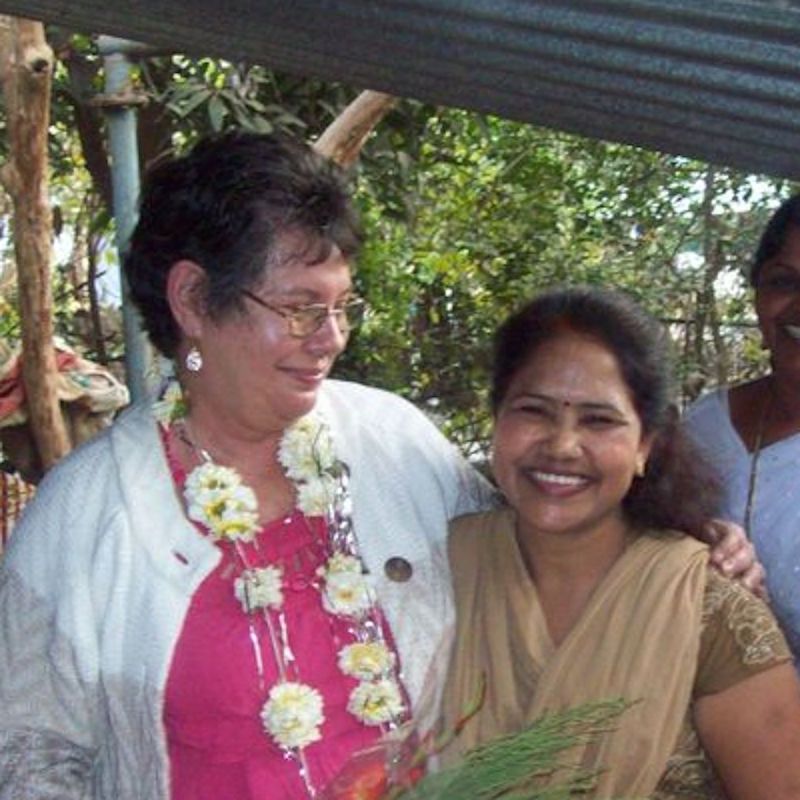
After a satisfying career as communications director for an international charity, I wanted my retirement to reflect my values and my dreams. For weeks, I explored options, then someone suggested I make an equation: values + dreams = ? I boiled values down to two words: “social justice.” Then dreams: “foreign travel.” Now, I had to solve the equation. My friend suggested I list opportunities that would combine working for social justice and foreign travel. She really should get an award.
Videos by TravelAwaits
I had connections with a community development organization in Nagpur, India. The president said he would welcome my volunteer assistance with programs, translation, and grant writing. Plus, the local college would like for me to teach English classes pro bono. The organization committed to providing a room in its three-story, secure facility, meals, and local transportation. The hostel was on the third floor, the office was on the second floor, and an auditorium and dining hall for conferences and events were on the ground floor. I was expecting to “give back,” but I gained far more than I gave to poor families and students in India.
1. I Won’t ‘Settle’ — No Matter What My Age
I had settled into a relationship that seemed ideal for a 60+ woman. He was secure financially and emotionally. He was kind, intelligent, and loved to travel. My India plans revealed the fatal flaw in our relationship. He would take a luxury rail journey through India, but his only involvement in charity work was writing checks. I chose India over him. Now that I am even older, I would not trade my lifestyle for security, companionship, or convenience. My love for adventure trumps my need for a committed relationship.

2. Making Do With Less Is Not A Sacrifice
I moved from a three-bedroom ranch in suburban Chicago to a cement block hostel in a small town in India. My hosts proudly introduced me to my room, the only one in the hostel with an ensuite bathroom. It had a two-burner stove with no oven. The walls were cement and the floor was cracked linoleum. My bed was so hard I could butcher a water buffalo on it. I had no TV or Wi-Fi. The shower was not enclosed; it simply rained on the entire room including the toilet. At three drops per minute, the shower was simply decoration. Bucket baths in a warm climate are easy and refreshing.
Soon, that one room became my cozy home. Life was easy. I had none of the homeowner headaches that plagued me in Illinois. I reveled in the simplicity of coffee, toast, and local honey in the morning followed by a one-flight-of-stairs commute to the office. After the workday, I unplugged: no TV, radio, or internet. I read more, walked more, and visited with my new friends. They took me to weddings — both Hindu and Christian — temples, festivals, a tiger preserve, the town’s one coffee shop, and lovely parks for picnics.
I had no car and none of the related hassles. The organization’s driver drove me to work related-sites in the office car. For other trips, I rode on the back of a friend’s motor scooter or took a tuk tuk: a three-wheeled motorized rickshaw.
3. I Can Depend On The Kindness Of Strangers
“It’s love gift,” exclaimed Dolly, refusing to take money for my haircut and eyebrow shaping. Vasanti massaged a clay pot of yogurt into my short hair to make it shiny while Vinta made a henna design on my hand. My little room became a spa that afternoon, and my new look was certainly different.
Colleagues gave me inexpensive earrings and bangles as I had left most of my jewelry at home. They also gave flowers, from leis of marigolds to vases of fragrant blossoms. It was Valentine’s Day several times a week. A co-worker’s “mummy” sent me a plate of samosas and another sent homemade sweets. But the greatest kindness was from a man I had never met and will never see again.
Several American men joined me for lunch one day in the facility’s dining hall. They were attending a conference in the building’s auditorium. When they invited me to accompany them on a visit to a mosque, I said “yes.” At the mosque, the gate opened for the men, then slammed shut in my face. I turned around and saw a crowd gathering. People were smiling and shouting questions in a language I did not understand. I did not feel threatened, but the crowd was overwhelming. I saw no way to return to our car through the street teeming with curious people.
The gate opened and an Iman stepped out. He was tall, had a long, grey beard, and was dressed in white. “Woman,” he said. “Where is your husband?”
I ducked my head and lied, “widow,” wondering if “divorced” would get me stoned.
“Where is your father?” he asked.
“Dead,” I said, looking up. His eyes were kind.
“I will be your father,” he said. He opened the gate, locked it behind me, and escorted me across the marble courtyard to a shady spot on a thick white line. Later, I learned this is the line women must not cross. He placed a metal folding chair right on the line, then brought me a glass of water. He vanished. I waited in comfort and peace for the American men who had abandoned me to the curious crowd. They returned excited about the ancient manuscripts they had seen, oblivious to the white line and its meaning.
4. The Difference Between Me And Indian Women Is A Sari
The main task of the organization I worked with is microcredit, also known as microfinance — giving small loans to people, mostly women, to start small businesses. A tea stand beside the road, a treadle sewing machine, kitchen utensils, and basic ingredients for a bakery are just a few of the microbusinesses these women own and operate.
Microloans, some as low as $25, enable mothers to feed their children nutritious meals and send them to school. As their businesses grow, a mud floor is replaced with cement, a tar paper shack becomes a one-room house, and an impossible dream, such as giving a daughter a dowry, becomes reality.
I was asked to “say a few words” to a group of 100 entrepreneurs who had gathered for a seminar on good business practices. I was at a loss. What could I possibly say to encourage and inspire women whose life experiences were so different from mine? I stepped to the podium with a paper scrawled with platitudes. I looked at the women. Like me, they wanted the best for their children; like me, they worked hard to provide nutritious food and educate their offspring. The glaring difference was that I wore a dress and they wore saris.
After greeting them, the words came like a gift from the universe. I began, “While men are making war, we women are cooking dal and raising children.” The connection was strong. I could see it in their eyes and smiles. I talked about our importance to our families and the world and sensed I was speaking to women everywhere. Most importantly, I was speaking to myself.
I spent four winters volunteering for that organization. I let acquaintances assume that I did it to escape Chicago winters. My family and friends know my reasons were more deeply rooted.
Read more about volunteer opportunities all around the world:
